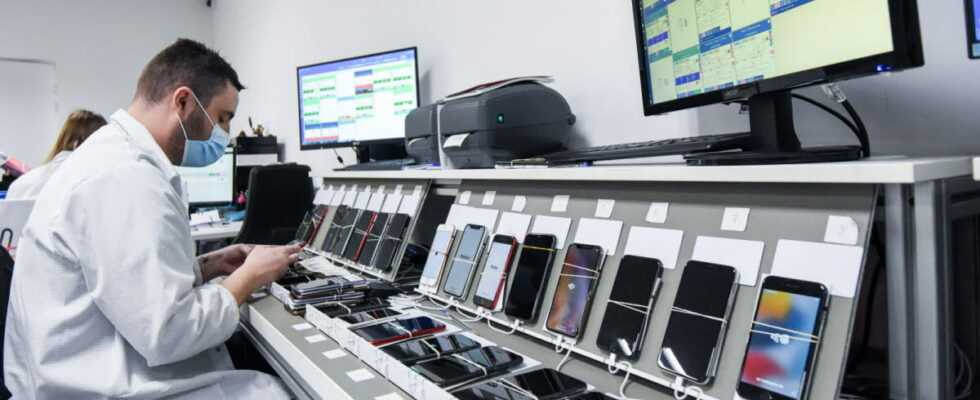How many are they ? Estimates vary from simple to double, between 50 and more than 110 million “used” devices would sleep, unused, among the French, according to Ademe (Ecological Transition Agency).
A real dormant waste. President-candidate Emmanuel Macron plans to finance a “return bonus” to encourage the recycling of these devices.
Every two years on average
The French renew their smartphone every two years on average. These so-called “smart” phones have become widespread in ten years, and today more than three quarters of French people have one … or even several, according to INSEE.
But when they are renewed, only a small minority of devices – around 16% – are recycled. Many users keep the old one, “just in case” or… because they are too lazy to resell it, give it away, or because they don’t know about the recycling channels.
Rare earths and metals… and expensive
Those that are in working order can be used by second-hand buyers, avoiding in the process the complete manufacture of a new device. A saving for the user, and for the resources of the planet: according to Ademe, “reconditioned smartphones are on average 8 times more virtuous than new ones”.
But even faulty devices are a veritable gold mine… both figuratively and literally: together, they contain a gigantic amount of rare metals.
As rare as they are strategic: these highly demanded metals are almost all imported for sectors such as electronics, batteries, etc.
In his “France 2030” plan, Emmanuel Macron had proposed this fall to develop industrial recycling sectors in order to reduce this dependence on imports.
Circular economy
The measure appears, logically, in his candidate program, now eager to further “green” his program:
When we improve the circular economy, we improve our independence. We passed laws and we will intensify
Emmanuel Macron, at the end of March, in Charente-Maritime
Long before the presidential election between the two rounds, on March 31, he had “stung” Jean-Luc Mélenchon’s idea of ”ecological planning”:
I assume this term […]. Do not see this as a conversion on my part, but I am pragmatic: when the proposed methods seem good to me, you have to know how to adapt them.
Emmanuel Macron
In this logic of “reconciling ecology and economy”, the president-candidate added that “ecology is a question of sovereignty, local jobs and revolution of uses”.
A bonus not yet quantified
Hence this idea of a “return bonus” applicable to mobile phones, tablets but also to computers:
This premium [permettra] to be less dependent on rare or critical materials and metals for our society
Emmanuel Macron’s campaign team
An ambitious proposal, but not quantified: the candidate’s team did not provide details either on the amounts of the bonuses or on the recovery channel envisaged. It could lean on the sector of recovery by the professionals of the old apparatuses with the purchase of a new, financed today by the ecoparticipation.
What can be recovered in a smartphone? Again, nothing is simple: each device weighs 100 to 200 grams, and contains up to 70 different materials – including 30 to 50% plastic, which is almost impossible to recycle, and 10 to 20% glass and ceramic, virtually irrecoverable and without market value.
40 to 60% metals in a smartphone
But also more noble materials. It remains to identify and separate these 40 to 60% of metals from each device (gold, silver, palladium, aluminum, chromium, tin, nickel, etc.).
Twenty of them can be recycled, with a high market value, especially in a context of global tensions: the Covid-19 pandemic is once again weakening trade with China, when the conflict in Ukraine weighs on certain materials raw.
Recycling 50 million devices each containing 0.1 gram of a single precious metal would make it possible to recover… 5 tonnes! Or 50 million euros of market value for gold, for example.
Such a return bonus can have a real impact on the supply of rare metals, and make it possible to produce less while recovering better.
Provided that the ecological impact of recycling itself is taken into account: as a Senate report reminds us, at the end of 2020, “after the use phase, the end of life of the equipment is also a source of pollution”.
